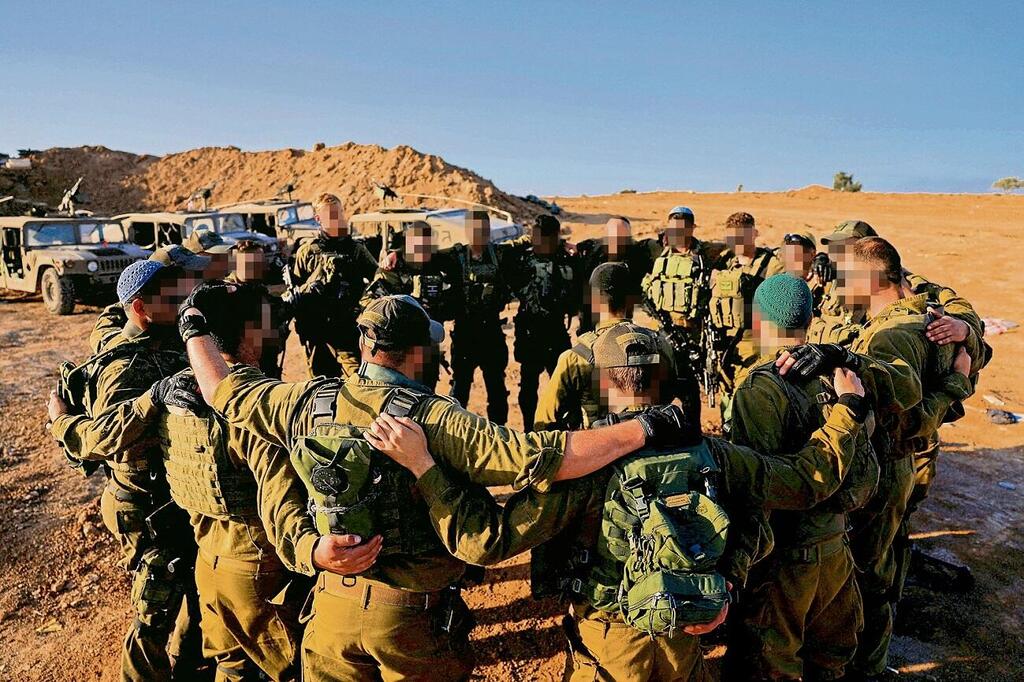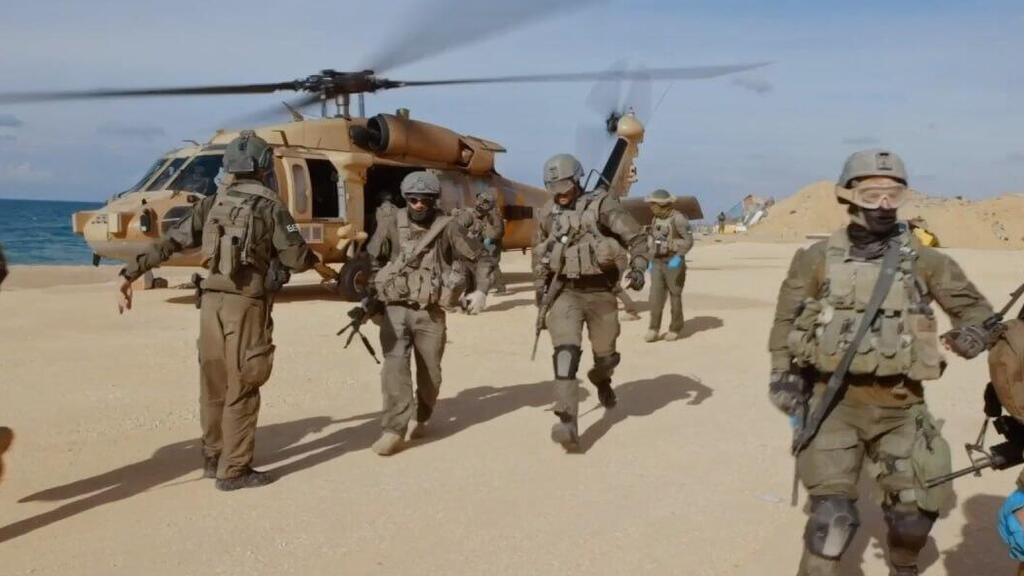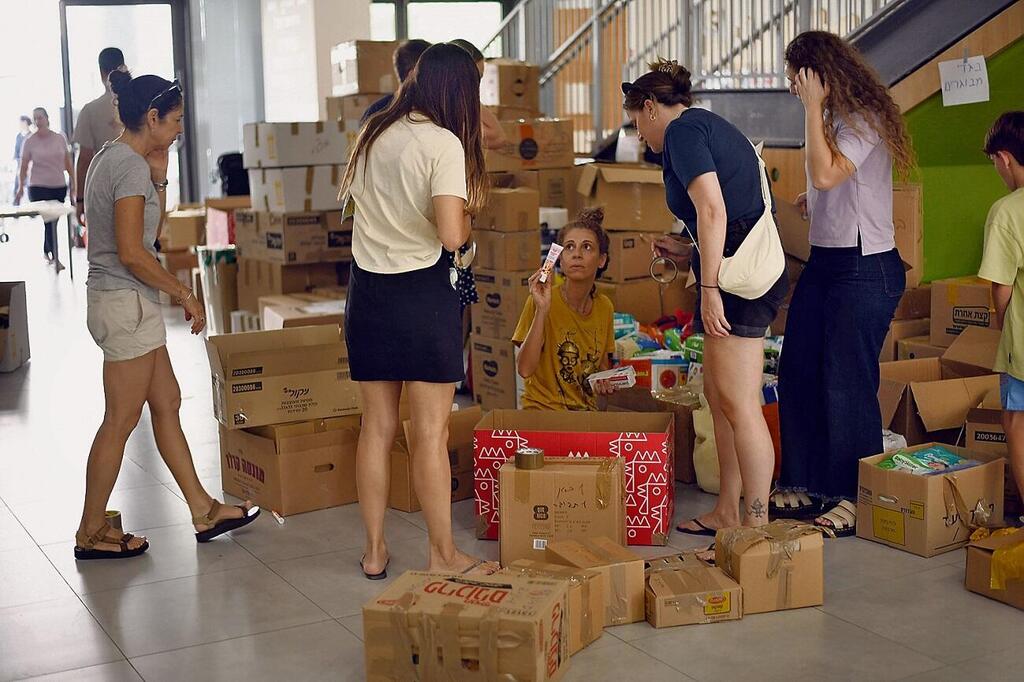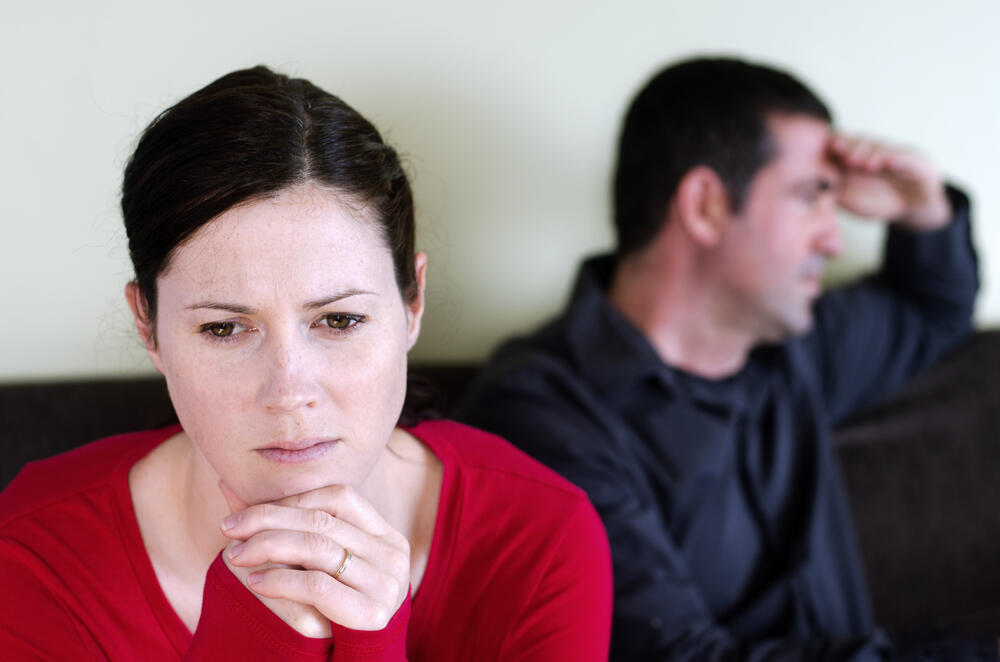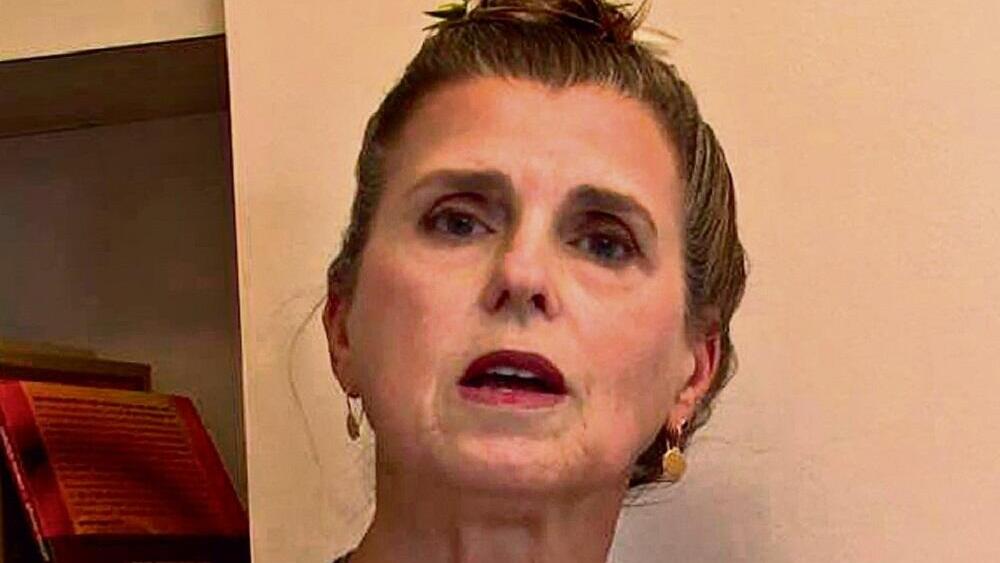“We didn’t have sex at all during the first week of the war,” says Sigal, 46, from Ramat Gan. “Do you remember what those first days were like? It was all such a shock. “We’d sit there from morning until three 3 a.m., each of us glued to our own phones, each of us at one with our own news. Itai and I couldn’t even talk to each other.
More stories:
"I felt I was surrounded by an invisible bubble. On the outside, I was the same woman, but I was completely disconnected. I couldn’t feel anything at all. I wanted to be alone. I wanted to process everything alone. I wanted to hurt alone. My libido dropped down to zero. Even a hug from him felt like touching a tree. Nothing made it through the bubble.”
I tell her that I felt, and maybe still feel, that bubble of isolation. It’s been around me since October 7th. It’s like I’m walking in my own private cloud. My partner said to me: “I can’t remember the last time I saw your eyes.” Unlike me, he does want to get back to normal.
He wants me to stop logging into the “From the Events of the Massacre” Telegram group every few minutes to see if another horrifying account has surfaced. He wants me to stop checking the “Newstime” group to see if, by any chance, we’ve killed Sinwar in the last half hour. He wants us to switch off the TV, open a bottle of wine, try to talk, and maybe even laugh.
I know it would be good for me to get close to him again, to get some kind of comfort from him. After all, the most important thing, especially in times of war is our love, my home, and my family. What are we fighting for if not for the best and most precious things? Either way, I keep embracing my own sadness. I cling to my grief like it’s a teddy bear.
It’s as if something bad will happen if I let go of it. “I’m not ready yet”, I tell my partner and he looks at me rather strangely. Ready for what? Should they bang a great big gold gong announcing the end of the period of mourning and that it’s time to get back to life as normal? He’s ready and wants our life as a couple back. I want to curl up in my sadness like it’s a big raincoat.
Dr. Yael Doron is a psychologist specializing in rehabilitative therapy and couples therapy, and is best known for her part on the hit reality show, “Married at First Sight.” As soon as the war started, she heard that inner voice so many of us were hearing: That voice telling us to go outside to see who we could help.
Since then, she’s been volunteering around the country, talking to people experiencing various personal and relationship problems resulting from the massacre. And there’s no shortage of them. On the day of our interview, I caught her on her way to the north of the country for a meeting with Armored Corps reservists who invited her to talk to them about how to improve their relationships with their partners while they’re away from home.
We’ll soon get onto the specific problem troubling so many combat soldiers and their partners but in the meantime, she tells me that this bubble that’s enveloped me and Sigal since October 7th is all too common.
”It’s a defense mechanism known as 'isolation,'" she tells me. “When a very difficult experience attacks us, we immediately separate our emotional mechanism from our cognitive mechanism – our thoughts. This proves extremely effective in difficult circumstances as lets us continue on auto-pilot. This is what enables our soldiers to fight feeling no fear."
"This is what allows people to spend 13 hours in a protected room with small children and no food or water. But in the long term, this mechanism comes at a price. This emotional shell stays in place, even when the emergency has passed. Then it needs to be treated.”
Sigal says that a few weeks into the war, she wanted to start having sex with her partner again. “It’s not healthy going so long without. It’ll become permanent” she explains. That’s one of the things I like about her relationship with Itai – come what may, neither will give up on romance.
"How do you suddenly switch over to having sex - that’s something happy and fun - after weeks of being engrossed in TV news, smoking a pack and a half of cigarettes a day, seeped in depression in an unventilated house?"
The moment one starts dozing off at the wheel, getting used to that monotonous plain of dull resignation, the other will kick them, reminding them of the love they have. “One evening, we said ‘Ok, it’s time we got back to having sex.’ And this was where the problem was. How do you suddenly switch over to having sex - that’s something happy and fun - after weeks of being engrossed in TV news, smoking a pack and a half of cigarettes a day, seeped in depression in an unventilated house?”
How?
“We usually have a glass of wine and play some music through the phone speaker. Itai likes electronic music, but the moment the first track came on, I felt sick all over my body. In an instant, I was at the Nova musical festival. The beats sounded ominous and diabolical. My whole body is limp from sadness. I can’t listen to happy songs or watch Netflix."
"Everything just feels so bland. Why should we sit watching a Scandinavian thriller about a high school girl who gets kidnapped and murdered? Why should I care about one dead Swedish girl? Here, they kidnapped and murdered hundreds of girls. And no one in this wretched world cares. Eventually, I convinced myself to disconnect and think sexy and positive. Then when Itai’s touch was a little wild, it happened.”
What happened?
“I had these visions. I suddenly saw Shani Louk right in front of me. How those filthy people were spitting on her naked body in the streets of Gaza. I shut my eyes and I had another vision. This time I see Naama Levy being dragged by her hair into the jeep in her blood-soaked sweatpants. I realized that no, I can’t just relax into sex right now."
"I’m afraid that if we carry on, I’ll get these visions again and I’ll feel fear and disgust when I’m with Itai, who’s my safe place, the place for pleasure and desire. I don’t want to see ten rapist terrorists instead of Itai. I felt they’d defiled me. Do you get it? Even though I wasn’t sexually abused myself. It’s like my mind isn’t protected anymore. These horrors can break in and attack my whole body.”
Back to ancient gender roles
On October 7, the country’s southern borders were breached, invaded, desecrated. With it, seemingly, our minds were penetrated too. This feeling, the feeling that this war is going on not only outside, but within our own bodies too. This war has made dark use of both women’s and men’s bodies as weapons. Knowing this, knowing that our own bodies can become a sadistic battlefield is terrifying.
“In this war, the subconscious has overpowered the conscious,” says Gilad Horowitz, a clinical psychologist who treats both couples and individuals, and also serves as a love therapist on “Married at First Sight.”
He continues, “It’s just so intolerable that such human evil exists, that we can be ripped apart and raped so easily. Yes, we’ve known wars and we know what goes on in the world, but we had good defenses against it. When it comes like this, like this massacre, our defenses are shattered and we’re overwhelmed by all the things we didn’t want to see or feel. The repressive defense mechanisms don’t work anymore. All this is hard to process. So, we live with it and start reorganizing ourselves around it."
"My masculinity was hurt. The feeling that I’m strong and that I can protect my wife and family. My country was violated and infiltrated and it’s as if I was infiltrated and humiliated."
This “strong stuff”, as Horowitz defines it, can't be alleviated and attacks us at the most unexpected of times. It seeps into our most intimate places. Yes, for men too. “It’s not like I wanted too much sex,” Itai tells me.
“My masculinity was hurt. The feeling that I’m strong and that I can protect my wife and family. My country was violated and infiltrated and it’s as if I was infiltrated and humiliated. You can’t be a strong and powerful man who knows what he wants, when you’re just so small. And they’ve been talking lately about the sexual abuse of men. “
“Sex is in danger right now” Doron agrees. “For a very small number of couples, the feeling of emergency actually increases desire and they use sex to relieve the pressure outside. But a much more common scenario is when one partner is interested and the other isn’t. Sex flourishes in a calm, safe, patient, creative, and playful environment."
"All this disappears when people are so engrossed in what’s going on outside. I was contacted by a woman whose husband came home on leave after a month of reserve duty. She naturally expected him to want sex. But he told her that he’d seen the most horrific sights and now, on leave, he just ‘needed a bit of quiet.’ She was taken aback, because this is a man who always wants sex and is always more relaxed after sex."
"She now felt she no longer had her ‘tool’ and she just didn’t know what to do to help him. She also suspected this was a sign of post-trauma. I reassured her that this is very common and that, in time, she should expect it to pass. It’s also important to react calmly and allow the partner who has ‘retired from sex’ to thaw out and recover spontaneously. Laying on pressure to perform can be more destructive than it might help at a time like this.”
October 7 made many of us do what Horowitz terms splitting. “The war has caused us emotional and internal regression” he explains. “What happens to us is that the complex world, in which we lived - that was full of various shades - has now become black and white. Suddenly there are good guys and bad guys, light and dark, and what a man is and what a woman is becomes very, very stark ways."
"For a long time, we’ve believed that we’re a progressive society, citizens of the free world, that we’re all androgynous, moving along a continuum. Then along comes this war, and we’re all back to our ancient gender jails. Women have reverted to feeling like objects or property."
"Look what happens in gender terms in Israeli slang right now: ‘They raped our women’, ‘They kidnapped our girls.’ In our souls and in our culture, the woman has once again become property, something through which you hurt men. They’re kidnapped, raped, passed around. It sounds harsh, but that’s what’s happening in this war.”
In other words, I, who had always thought I was a progressive person, am now back to being an object for whom this world is a dangerous place.
“When we get into bed, we’re supposed to be entering a kingdom that’s very intimate, a place where we let ourselves be defenseless because we’re safe. This safety has now been breached. It’s very hard to feel protected again. The man may suddenly feel guilt, that he himself is a rapist or an aggressor, and the woman might feel attacked even when she’s with the man who loves and cherishes her so dearly.
Men in Khan Younis, women in the kitchen
It's odd. On the one hand, we’ve seen the steel resilience of Israeli women such as Yocheved Lifschitz and Yaffa Adar who scolded the terrorists for not giving the tunnels a quick clean because, after all, we’re not living in a jungle – through to the courageous policewomen and female soldiers who defended Ofakim or IDF bases with outstanding bravery.
On the other hand, many of us have reassumed our old gender roles. True, there are lots of female fighters, but statistically the division clearly goes like this: The man goes off to be a brave soldier and the woman stays at home with the children.
One such woman is Lia, 33, from Kfar Saba. Lia holds a senior hi-tech position. This was very much part of her identity on October 7th. Since then, her husband has been serving in the Maglan reconnaissance (Sayeret) unit in Gaza, and she’s been sent back to the Stone Age.
Her husband is the star of the war, the darling of the female volunteers who send fan messages in the couscous. She plays a supporting role in taking care of the children. “I pray that he’ll get hit by shrapnel and that he’ll come home,“ she tells me directly. “As far as I’m concerned, he can break a leg. These past few weeks have broken us. I’m broken.”
She chokes on her tears and I realize this isn’t funny. “Since the beginning of the war,” she says, “I’ve had three nervous breakdowns. I fainted last time. I’ve reached the point that I’m fainting because I can’t take it.”
“It was okay for the first month. I carried the war and the security failure on my own shoulders. But now, I’m worn out and I’m worried for my children. This war caught me as our two sons started new kindergartens. Our sons are one and four years old."
"The week before the outbreak of the war, we also moved house. I found myself in a big new home – but with no saferoom. By 11 o’clock on that Saturday morning, Dvir was in uniform and I moved to my parents. Each time I tried going back to the apartment, I collapsed into a decline.”
“And my son’s having a hard time making the transition to the new kindergarten. He’s a very sensitive boy and he’s been deeply affected by the war. He’s seen his father twice since the war began. By the third week, he stopped asking about his father."
"I took him to a developmental psychologist who said he was in a 'Freeze Mode' that can later lead to disassociation and social problems. I go to work to make a living, but I mainly just cry when I’m there. That’s the truth.”
The main problem, Lia says, is that she can’t pour out all of these problems to her husband. Let’s start with the fact that she cares for him and she wants to be the best wife she can be for him. An auxiliary fighter, funny and optimistic, supporting and strengthening him in their short conversations – not a huge pile of bitter resentment.
“He's been home three times since the beginning of the war,” she says. “The first two times were a complete lie. My complete lie. I stood at the front door, smiling with make-up on and the aroma of the cooking wafting through the air. I got cooking in my new kitchen – the kitchen in which I haven’t spent a minute. I faked joy."
"During his last, 11-hour leave I just gave in. And then it was real. I burst into tears. I let it all out. I tried describing the balance I don’t think he sees. Yes, national values are important, Zionism and sacrificing oneself for one’s country – but what’s any of this worth if the kids are broken? He tried reassuring me ‘You’ll get past this. You’re strong.’ This just caused me to distance myself even more.”
I call this feeling Lia’s double-line; she can’t fully feel the anger and frustration about being abandoned, being alone with their family that’s falling apart, because beneath this feeling lies another feeling: anger toward herself, that this is how she dares feel toward her hero, coupled with the guilt that she would be severely punished if she stopped caring for him every moment and became resentful.
When he finally does return, she really just wants to throw the kids at him, as she would do when he’d come back from overseas vacations. But he’s not coming back from a skiing holiday. He’s coming back from Khan Younis.
“That’s the real problem,” says Dr. Idit Gutman, a clinical psychologist from the School of Psychological Sciences at Tel Aviv University. “The daily routine of laundry, babysitters, and the children’s Zoom sessions might sound less heroic, but it’s intense, stressful, and exhausting and it isn’t appreciated in our culture."
"It’s called the ‘region-beta paradox’ – ‘routine’ pressures don’t warrant support and consideration. Even we, ourselves, aren’t aware of the hardships they cause, and recovering from these hardships is more difficult than from acutely stressful situations like fighting in wars."
“Women generally have more ‘maternal awareness’ – a constant chronic sense of vigilance and responsibility toward their children – regardless of their age. This only magnifies the unspoken emotional burden they carry. Now, add to that the existential fear of waking up the baby to move him into the safe room, abating the children’s fear of terrorists under the bed, and planning where to hide them if there’s another attack."
"There’s a great deal of guilt involved in admitting this to the soldier partner because it makes you less good as a wife and partner. The strong emotions connected to the war obstruct our ability to see intricacies and complexities. This simplification that’s been forced upon us, pushes toward disassociation and disconnection of many parts of one’s self that we had before. “
Most of the soldiers’ wives we spoke to talked about the painful feeling that their husbands would stop seeing them – that they would become invisible. He’s there in his unit. Without belittling the danger he’s in, his experience is an emotional one of friendship and deep bonding.
It can be jokes or partying along to Lior Narkis entertaining the troops, or late-night heart-to-hearts behind the tent with fellow company members. In the meantime, in your home, you’re the furthest you’ve ever been from any kind of experience of friendship and deep bonding. You’re alone in the hardest campaign you’ve ever waged.
You need to clean the house and feed the children who miss their father. When he calls, he just doesn’t understand how much you’re struggling. It’s suddenly men from Jabaliya and women from the Jamboree. And you try so hard, but sometimes feel that he wants to get back to his reserve duty buddies, where no one cares if he leaves his underwear on the shower floor.
A different way to cope
Eran isn’t in reserve duty. “I’m too old,” he says. “I begged them to take me back to my armored corps unit. They laughed in my face. Who needs a tall, 50-year-old with a triple-disc herniation? So, I’m at home. And I feel ashamed. I sit in cafés and see people looking at me thinking ‘What’s he doing here? He’s healthy enough to order cake. Why isn’t he in Gaza ?’"
"I might be imagining it because I’m so ashamed of myself. I see it in the way my wife looks at me. Why am I lying on the sofa like a cushion and not doing something with myself like go get a gun permit? She doesn’t go woozy watching Daniel Hagari, but I’ve noticed her reacting very favorably to Eylon Levy’s eyebrows. Anyone doing something, taking part in the war effort, is more of a hero to her than I am.”
He says that one of the problems is that partners’ different ways of coping with the current situation are a disaster. “My wife almost immediately became ‘Mother General’ he says. “From about the second day of the war, she was volunteering in a restaurant cooking for soldiers, and in the afternoons, she goes to Hostages Square to show her support for the families."
"She can’t watch even a single horrific video. She refuses to watch sad items on TV, no matter how heart-wrenching. As for me, I’m watching the news at least nine hours a day. I can’t take my eyes off the screen. So, she berates me. ‘Don’t you understand that the key is doing more and more? Stop consuming all these horrors. It doesn’t help anyone with anything.'”
Doron: “There are discrepancies in the ways people cope with the war and the grief. Let me give you some examples:”
“Firstly: One partner is active, volunteering, getting out of the house, while the other is passive, staying at home, curled up on the couch. Secondly: One spouse finds information relaxing, while the other refrains from too much information."
"A third example might be that one spouse may be rather laissez-faire about the children, while the other feels it’s important to stick to rules, routines, and frameworks. Another example might find one partner who finds shopping and ordering goods online relaxing, while the other feels it’s time to tighten the purse strings. “
“The fact that our partner is ‘other’ from us and reacts differently in certain situations seems very attractive at the beginning of the relationship. But as time goes by, these differences become a burden. We don’t have the strength to deal with our partner’s ‘otherness’, even more so in times of war."
"Now, as our fuses are short, our ability to accept that the other person reacts differently to us is diminished. The most challenging aspect of couples therapy right now is to understand how their otherness completes my behavior pattern, and that it’s not against me."
I think about something my partner said that’s hard for me to accept, but I have to because he’s my cleanest and most loyal mirror. “Something nasty has gotten into you,” he said. “Something you never had before."
"Do you remember how you yelled at me about how I hadn’t cleaned up the protected room? You started off with why hadn’t I put a six-pack of water bottles in there or gotten a wooden plank with a hole in to lock the door. When I said I was on it, it was as if you were possessed when you started screaming about machetes.”
And he’s right. That’s exactly what happened. “And as for you not having a gun…” I said to him “But you’re a man, you’re supposed to want to protect me. You’re supposed to want to be prepared to murder them when they show up. What’s happened to you during this war? Where’s your masculinity gone?” And that’s where my mean side came out. I’d never called him out on his masculinity.
Let’s start with the fact that I think he's very manly. I love that he’s sensitive and creative as well as having broad shoulders - both physically and mentally - that I can lean on. Now let’s get onto that, at least before the war, I was a person perfectly aware that each and every one of us has both masculine and feminine sides – so where are these lines about you not being macho enough coming from?
Horowitz: “What you did here was splitting and projection. The first thing you did was split between man and woman. You put all the strong, fighting elements with your partner - he’s the man. The second thing was you projected. You projected all the traits that you can’t attribute to yourself. You feel you can’t protect yourself, so your man has to protect you, and if you feel weak or scared, it’s not you but rather it’s your wife who feels like this."
"We need to start by taking back the parts we’ve projected onto our spouses. She’s not the only one who’s anxious. He’s not the only one who’s scared or irritable. It’s hard to see other people as layered during wartime. This is one of the things we work on in couples therapy. We try distancing ourselves from these splits and remind ourselves that we all have both masculine and feminine sides. It then recedes. This is one part of the secondary trauma from which we’re all suffering."
Please explain
“What’s secondary trauma? The symptoms are the same as those of Post Traumatic Stress Disorder (PTSD.) Arousal - We constantly feel that we need to be doing something and we find it hard to just relax and breathe. Intrusions – Constant intrusive thoughts that keep coming to us without our wanting to think of them. You look at your small child and suddenly imagine someone cutting off their head. In war, suppression mechanisms go kaput, and you just can’t repress it."
"Avoidance – We avoid doing regular everyday activities. At the beginning of the war, we weren’t going to the supermarket and we were afraid to take the children into the garden. And, of course, negative thoughts – What is there to live for? What will become of me?”
And this secondary trauma is present in our relationships?
“For sure. Let’s start with avoidance. Getting into an intimate situation now is scary because they might be a siren. This, in turn, leads to intrusive thoughts – In your mind’s eye, you suddenly see images of sexual violence, and we’re also in a state of excessive arousal, and it’s hard to be in a pleasant intimate situation when you’re constantly feeling stressed and vigilant. Add to that the negative thoughts that perhaps have no bearing on this experience of love and your life as a couple.”
So, what should we do?
“Let’s get back to feeling that we’re complex human beings, that we have weak and strong points, masculine and feminine sides. My first piece of advice would be to crack open a bottle of wine together one evening and just talk. Each side should reveal what they’re feeling.“
Ruth Ben Asher is a clinical psychologist, and couples and trauma specialist. She has an explanation for the anger and nastiness that suddenly burst out for no reason: “Our exposure to the terrorists’ human evil has also pierced the most difficult parts of our souls. Our souls were penetrated, and when that happens all our demons are released. It can take the form of being short-tempered, angry, or horrible."
"We might find that we’re suddenly mean or nasty to our partners. When we’re cultured people, we have coping mechanisms. We know the correct interpersonal codes for relationships. We know these mechanisms lead us to the right behavior. When these mechanisms are damaged and we’re penetrated, it’s like opening up a sewage cover.”
Perhaps it’s also a way of feeling strong again – that I so don’t feel right now.
“Energy of anger is an energy of strength. You might even call it the healing power of aggression. Anger reinstates agency – the feeling that you’re the master of your own life. “
What should I do to stop isolating myself in my own bubble of grief? I don’t understand why I do it. Why is this happening to me?
“Recognize that it doesn’t matter why it’s happening to you. It’s much simpler to just accept it. Accept and agree that you’re inside this grief. When you recognize that you’re in a bubble and that it’s disconnecting you from your spouse, how can you renew your connection with him? Baby steps. Nothing huge. Sparks of magical things throughout the day that you recognize."
"You might notice that you can hear a bird singing, or you might hear a song you like playing in the background. It’s worth being geared toward these sparks, aiming ourselves toward these beneficial things so as to start softening and reducing the bubble. If you want to go back to your loving relationship, lift up your eyes and meet his gaze. Renew the spark. Even if it’s just for a moment. “
Start coaxing my soul out to get back to feeling good things.
“Exactly. Coaxing your soul out. I like the word ‘coaxing’ because it’s not by force. It’s a gentle invitation. It’s a request. Start addressing the very center of your soul to agree to come out. Coming out of yourself and the bubble of sadness doesn’t mean you’ve forgotten your grief."
"Don’t give up on your grief for a moment. It also doesn’t mean that you’ve forgotten or you’re abandoning all those who lost loved ones or were actually hurt. Not just that – when you renew your connection with your spouse and make yourself stronger, you can get on with your grief much better. You’ll be able to feel what you need to feel. And not from a place of trauma.”







